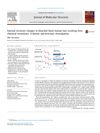 4 citations,
August 2014 in “Journal of molecular structure”
4 citations,
August 2014 in “Journal of molecular structure” Chemical treatments on bleached black hair change its internal structure by breaking and reforming bonds, and treatments with hydrolyzed eggwhite protein help repair it.
 3 citations,
April 2011 in “Microscopy research and technique”
3 citations,
April 2011 in “Microscopy research and technique” Teratoma hair is similar to scalp hair but has a rougher surface and lower adhesive force.
 21 citations,
December 2016 in “European journal of pharmaceutics and biopharmaceutics”
21 citations,
December 2016 in “European journal of pharmaceutics and biopharmaceutics” Nano-sized lipid particles increase dexamethasone's skin penetration and create a reservoir in the skin layers.
[object Object] 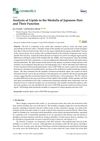 7 citations,
April 2018 in “Cosmetics”
7 citations,
April 2018 in “Cosmetics” Lipids in Japanese hair help maintain glossiness and structure.
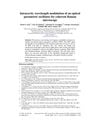 35 citations,
July 2009 in “Optics express”
35 citations,
July 2009 in “Optics express” Researchers created a new light source that improves chemical imaging by removing background noise.
 5 citations,
November 2014 in “Journal of Pharmaceutical Sciences” 32 citations,
February 2018 in “Spectrochimica acta. Part A, Molecular and biomolecular spectroscopy”
5 citations,
November 2014 in “Journal of Pharmaceutical Sciences” 32 citations,
February 2018 in “Spectrochimica acta. Part A, Molecular and biomolecular spectroscopy” Cosmetic residues on individual hairs can be identified and differentiated using ATR FT-IR microspectroscopy.
17 citations,
January 2012 in “European Journal of Pharmaceutics and Biopharmaceutics” Isoconazole nitrate stays effective in skin and hair follicles for up to two weeks after use.
15 citations,
September 2014 in “PloS one” The study found that analyzing certain cell signaling pathways is not a reliable method to tell apart two types of skin tumors.
9 citations,
July 2014 in “Skin research and technology” Stretching damages Caucasian hair's structure more easily than Asian hair.
33 citations,
February 2009 in “European journal of pharmaceutics and biopharmaceutics” Pig ear skin is better than human skin for testing how well barrier creams block allergens from entering hair follicles.
1 citations,
July 2022 in “Clinical, Cosmetic and Investigational Dermatology” Taohong Siwu Decoction may help treat hair loss by targeting multiple genes and pathways.
 13 citations,
January 2017 in “Cosmetics”
13 citations,
January 2017 in “Cosmetics” Different tests are used to see how hair care products affect hair, and choosing the right test is important for accurate results.
 93 citations,
November 2018 in “Carbohydrate Polymers”
93 citations,
November 2018 in “Carbohydrate Polymers” New nanocomposites with copper show promise for healing burn wounds and regenerating skin.
 21 citations,
March 2017 in “Skin research and technology”
21 citations,
March 2017 in “Skin research and technology” Removing external lipids from hair reduces moisture and increases strength, while removing internal lipids decreases water permeability.
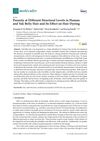 6 citations,
May 2020 in “Molecules/Molecules online/Molecules annual”
6 citations,
May 2020 in “Molecules/Molecules online/Molecules annual” Yak belly hair has higher porosity and is less stiff than human hair, making it absorb dye better but less suitable as a direct substitute for hair dyeing.
[object Object]  37 citations,
August 2014 in “Journal of experimental botany”
37 citations,
August 2014 in “Journal of experimental botany” A gene in Arabidopsis thaliana, AtPRPL1, affects root hair length but not cell wall composition.
 April 2017 in “Journal of Investigative Dermatology”
April 2017 in “Journal of Investigative Dermatology” Deep phenotyping helps distinguish between xeroderma pigmentosum and trichothiodystrophy, aiding in diagnosis and treatment.
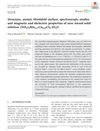 January 2019 in “Applied Organometallic Chemistry”
January 2019 in “Applied Organometallic Chemistry” The compound (NH4)2Mn0.17Cu0.83Cl4.2H₂O has a specific structure, shows weak magnetism at low temperatures, and undergoes phase changes at high temperatures.
 41 citations,
May 2018 in “Nutrition and healthy aging”
41 citations,
May 2018 in “Nutrition and healthy aging” Skin aging is largely due to differences in stiffness and elasticity between skin layers, leading to wrinkles.
 16 citations,
January 2017 in “Physical chemistry chemical physics/PCCP. Physical chemistry chemical physics”
16 citations,
January 2017 in “Physical chemistry chemical physics/PCCP. Physical chemistry chemical physics” The 3D structure of a key hair protein was modeled, revealing specific helical structures and stabilization features.
 14 citations,
July 2017 in “Monatshefte für Chemie - Chemical Monthly”
14 citations,
July 2017 in “Monatshefte für Chemie - Chemical Monthly” Analytical chemistry helps understand the makeup and use of ancient medicines, but it's complex and challenging.
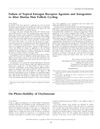 6 citations,
January 1998 in “Journal of Investigative Dermatology”
6 citations,
January 1998 in “Journal of Investigative Dermatology” Estrogen receptors may not affect mouse hair growth as previously thought, and oxybenzone in sunscreen is stable in sunlight.
 4 citations,
December 2018 in “Macedonian Journal of Chemistry and Chemical Engineering”
4 citations,
December 2018 in “Macedonian Journal of Chemistry and Chemical Engineering” A new method accurately measures amino acids in treated hair, showing bleaching reduces amino acids while protein treatments increase them.
 1 citations,
April 2017 in “Journal of Investigative Dermatology”
1 citations,
April 2017 in “Journal of Investigative Dermatology” Topical glucocorticoids thin the skin and change collagen structure.
 11 citations,
December 2020 in “Notulae botanicae Horti Agrobotanici Cluj-Napoca”
11 citations,
December 2020 in “Notulae botanicae Horti Agrobotanici Cluj-Napoca” Mycorrhizal fungi and shading improve tea plant growth and nutrient uptake by changing hormone levels and gene expression.
 1 citations,
December 2018 in “IntechOpen eBooks”
1 citations,
December 2018 in “IntechOpen eBooks” Human hair shows promise for non-invasive medical testing, but more research is needed to standardize its use.
6 citations,
September 2018 in “ACS applied bio materials” Calcium fatty acid deposits found in human hair can change its appearance and feel.
 January 2024 in “International Journal of Cosmetic Science”
January 2024 in “International Journal of Cosmetic Science” A new method using 1,4-n-butylene dimaleate effectively repairs and strengthens damaged hair.
November 2023 in “Cosmetics” Rice derivatives in conditioners protect and improve hair health.





















